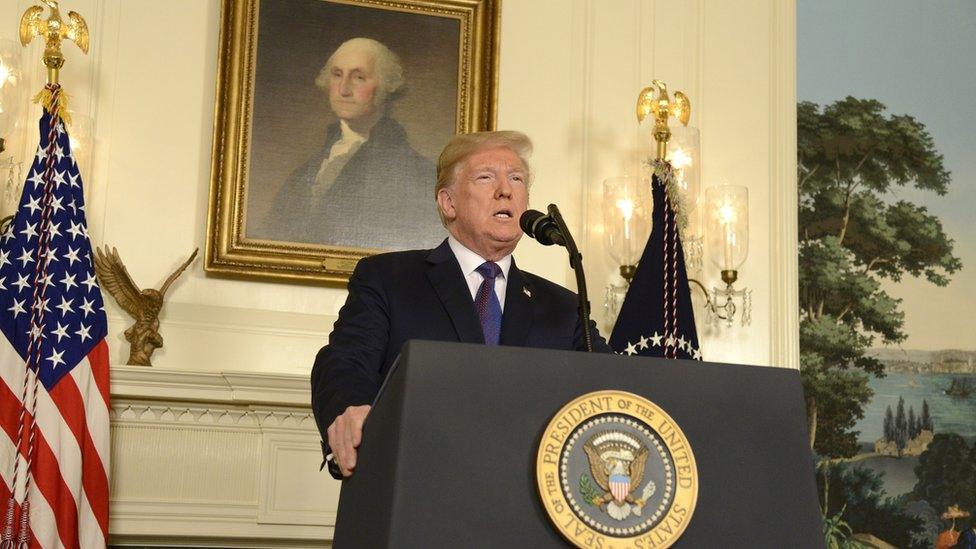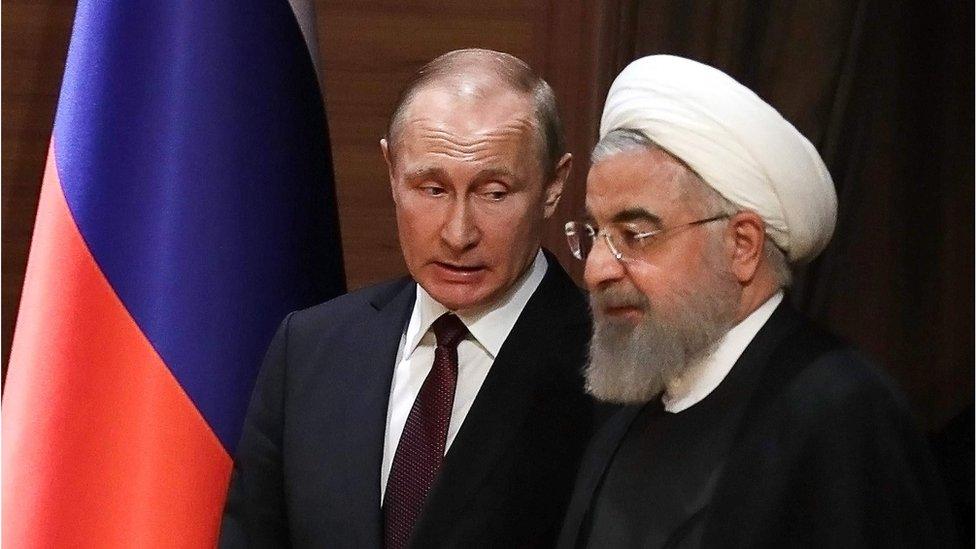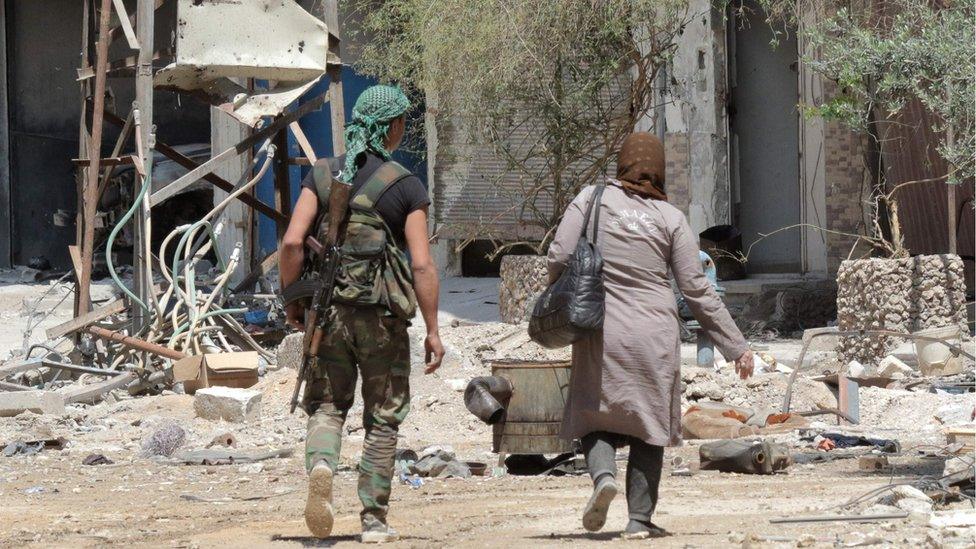PJ Crowley: Can Trump walk away after Syria air strikes?
- Published

The US leader has all but admitted the broader Syrian war is not a US interest
Former US Assistant Secretary of State P.J Crowley says President Trump will be content to count the strikes as a victory and move on, but it's unclear if Syria, Russia and Iran will let him:
As a presidential candidate, Donald Trump pledged: "If I draw a line in the sand, I will enforce that line in the sand. Believe me."
A year ago, as president, Mr Trump ordered a military strike involving 58 cruise missiles in response to a deadly sarin gas attack on civilians, and he essentially redeemed the red line that his predecessor, Barack Obama, drew in 2013.
While Mr Trump received plaudits for his willingness to employ military force, if he expected that show of force to deter the further use of chemical weapons by Syrian leader Bashar al-Assad in this brutal civil war, he was wrong.
Secretary of Defence James Mattis acknowledged as much Friday night, that despite last year's strike Syria has continued to employ chemical weapons, most recently against an opposition stronghold outside Damascus.
Mr Assad, he said, "did not get the message last year".
So Mr Trump, together with British Prime Minister Theresa May and French President Emmanuel Macron, launched coordinated military strikes against Syria's chemical weapons infrastructure, including a research centre, storage facility and command post.
There is a new red line, but what is the message behind it? What are the odds that Syria, and its key international backers Russia and Iran, will heed it? And what are the consequences if they don't?
Moment cruise missiles were launched from a French naval ship
Mr Trump, Mrs May and Mr Macron have actually drawn a sharper red line than Mr Obama did — no further use of chemical weapons in the Syrian civil war, including chlorine barrel bombs that Syria has used routinely over seven years.
While the latest strikes were described as a "one-time shot," Mr Trump threatened to take further military action should Syria use chemical weapons in the future.
"We are prepared to sustain this response until the Syrian regime stops its use of prohibited chemical agents," Mr Trump said.
Mr Trump was surprisingly understated Friday night in his comments regarding Russia and Iran.
In the immediate aftermath of the Syrian chemical attack, Mr Trump promised that not just Syria, but Russia and Iran as well would "pay a price" for again violating international norms.
Unverified video shows children being treated after the alleged gas attack
If so, it will be through a different means.
Friday's strikes targeted Syria's chemical weapons capability, but were specifically designed to avoid Russian and Iranian forces, avoiding the risk of an unwanted confrontation and possible escalation.
Instead, he called on both Russia and Iran to re-evaluate their support for Assad, saying that nations are "judged by the friends they keep."
While Mr Trump directly criticized Russia for failing to guarantee the elimination of Syria's chemical weapons as it promised in 2013, he incongruously suggested that the door was still open to better relations, even with Russia's interference in the 2016 presidential campaign and its recent use of a nerve agent against a former intelligence operative in London.
"Hopefully, someday we'll get along with Russia and maybe even Iran, but maybe not," he said.
There is little prospect of cooperation regarding Syria because the two sides continue to wage different wars there.

Both Russia's Putin (L) and Iran's Rouhani view Syria as a vital interest
Both Russia and Iran consider Syria, and at least for now Mr Assad's survival, as a vital interest. Mr Assad's position has strengthened considerably in the year between Mr Trump's military strikes.
Friday night's military action was designed to thread a pretty narrow needle - place boundaries around the war Syria, Russia and Iran are waging - without becoming a direct combatant in it.
The US and its European partners have a narrower military interest in Syria - the defeat of the Islamic State caliphate, a task that is nearing completion.
Just two weeks ago, Mr Trump stated his intention to bring home the roughly 2,000 US personnel deployed to Syria as quickly as possible, only to confront the chemical attack on Douma.

Mr Trump said it was not up to the US to fix the Middle East
Even with the new red line - Trump did declare the deterrence of the use of chemical weapons to be a "vital national security interest of the United States" - he all but admitted that the broader Syrian civil war was not.
He described the Middle East as a "troubled place" and reiterated it was not the role of the US to fix it.
"We cannot purge the world of evil or act everywhere there is tyranny," he said, adding: "The fate of the region lies in the hands of its own people."
Mr Trump will be content to count this as a victory and move on - he has already declared "Mission Accomplished!" in a follow-up tweet - but that depends on Syria, Russia and Iran and whether they get the message this time.
Of course, the last time an American president employed those words, it represented a serious misreading of the challenge he confronted. But Syria isn't Iraq. It's actually much more complicated.
PJ Crowley is a former US Assistant Secretary of State and author of Red Line: American Foreign Policy in a Time of Fractured Politics and Failing States